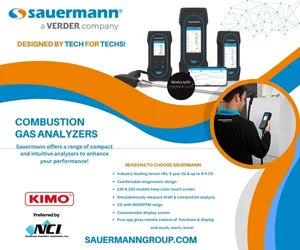The Right Tools For Each Field Role
Depending on their role, each of your ‘eld-based people will need a different set of tools and instruments. The following is a breakdown by role:
 Salesperson/Comfort Consultant: While your salesperson can start with a few basic tools, eventually they will need the instruments below in order to properly test and diagnose air distribution issues.
Salesperson/Comfort Consultant: While your salesperson can start with a few basic tools, eventually they will need the instruments below in order to properly test and diagnose air distribution issues.
Here’s a list of tools and instruments to take on a diagnostic sales call:
- Manometer kit with pressure tip, drill bit and stop, and hole plugs
- Airflow Capture Hood
- Digital Anemometer
- Digital Hygrometer
- Infrared Thermometer
- Pocket Thermometers
- Distance Measurement Device
- CO Analyzer, portable CO monitor, or NSI Low-Level Monitor
- Cordless Drill
- Basic Hand Tools.
Service/Maintenance Technician: A service tech should carry the following instruments to identify and diagnose performance, comfort, and safety issues:
- Manometer kit with pressure tip, drill bit and sheath, and hole plugs
- Digital Hygrometer
- Infrared Thermometer
- Pocket Thermometer
- Remote Amp Meter Clamp
- Digital Tachometer (light commercial)
- Combustion Analyzer
- Draft Gauge.
 Installer: Depending on whether your installers perform their own startups, they should carry some or all of the following instruments and tools to test their installations:
Installer: Depending on whether your installers perform their own startups, they should carry some or all of the following instruments and tools to test their installations:
- Manometer kit with pressure tip, drill bit and stop, and hole plugs
- Digital Hygrometer
- Infrared Thermometer
- Remote Amp Meter Clamp
- Digital Tachometer (light commercial)
- Combustion Analyzer
- Draft Gauge.
Diagnostic/Test and Balance Technician: Whoever does the ‘nal testing and balancing of your residential and /or light commercial installations should carry the following tools and instruments:
Manometer kit with pressure tip, drill bit and stop, and hole plugs
- Airflow Capture Hood
- Digital Anemometer
- Digital Hygrometer
- Infrared Thermometer
- Pocket Thermometer
- Remote Amp Meter Clamp
- Digital Tachometer (light commercial)
- CO Analyzer or Low-Level Monitor.













Recent Comments